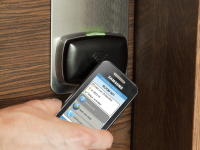

Every year the hospitality industry gets together to talk about technology and its impact on the sector at HITECH. This trade show highlights the newest technology solutions for hotels, and recently some new room locks have been designed to allow guests to use their cell phone as a key. These locks utilize a form of RFID (Radio Frequency Identification) technology called NFC (Near Field Communication) that allows devices to connect when they touch. Most modern cell phones are equipped with this feature, but few people are using it.
In an attempt to pioneer this technology, Hilton announced that they will be installing NFC enabled room locks in the majority of its properties. This will allow guests to unlock their room doors with their cell phones. Their goal is to combine this technology with their mobile apps and enable guests to check-in over the phone, bypassing the front desk altogether. Hilton feels this will leave staff free to concentrate on providing better customer service for guests who need more than just a check-in transaction. So the question is, "If it's good enough for Hilton, is it right for your hotel?"
Convenience is critical with NFC. It allows guests to tap or wave their phone over their door locks, and it will most likely replace magnetic stripe keys. Developers of this technology state that the security is much more stable and secure than standard magnetic keys. Anyone who has worked the front desk knows how often guests demagnetize their keys, and that reprogramming them takes up a lot of additional time. This time-saver would allow desk agents to focus on guests with issues or their administrative duties. Many larger brands have introduced mobile apps as part of the guest loyalty programs, and are looking to strengthen these programs with NFC locks and enabling portable check-ins and the ability to pick their room for its members.
Hotel door locks are already expensive, and NFC enabled locks are no different. Because of Hilton's size, they are undoubtedly getting a substantial volume discount to offset these costs. Unfortunately for independent hotels, their price is going to be a lot higher. One of the biggest challenges Hilton is going to face with this system is educating their guests on how to use it. Traditional key systems are pretty straight forward, but these locks are going to require more participation and understanding from the guest. The tech-savvy will have no issue sorting out the process, but for others, there will inevitably be some bumps along the way. With the growing importance of online reviews, those bumps can quickly turn into broader issues online.
While this technology is already being used in hotels to help cut down on linen theft, it's just a matter of time before new applications are developed, and it's as common as free wifi. If you're already in the market for new door locks or want to be on the cutting edge of technology, take a look into what NFC can offer, keep in mind there is a much larger infrastructure needed to operate them. For everyone else, don't worry about it at this stage. The cost to install and educate guests about these locks is disproportionate from their current benefits. With most technology, prices tend to drop quickly, and incorporating it into your property will be much easier.
NFC, or Near Field Communication, is a short-range wireless technology that lets two devices exchange data when they are a few centimeters apart. In hotels, the guest's phone stores an encrypted digital key; tapping the phone on the door lock sends the credential, unlocking the room without physical cards.
Guests no longer queue for replacement cards or even visit the front desk. They can check in through the hotel app, go straight to their room, and simply tap the phone to enter. This saves time, reduces demagnetized key hassles, and frees staff to focus on more complex guest needs.
NFC locks use encrypted communication and unique digital keys that are difficult to clone, offering stronger protection than magnetic stripes, which can be skimmed or demagnetized. However, overall security still depends on the lock vendor's implementation, backend systems, and the hotel's cybersecurity practices.
High hardware costs, especially without big-brand volume discounts, are the biggest hurdle for independent hotels. Staff and guests need training on mobile check-in and tapping procedures, and technophobic visitors may become frustrated, triggering negative reviews. Upgrading also requires reliable apps, backend servers, and ongoing technical support.
If you are already replacing locks or targeting tech-savvy loyalty members, investigating NFC now can give you a competitive edge. Otherwise, wait until costs drop and standards mature; early adoption expenses and training efforts may outweigh benefits for smaller properties with limited budgets.